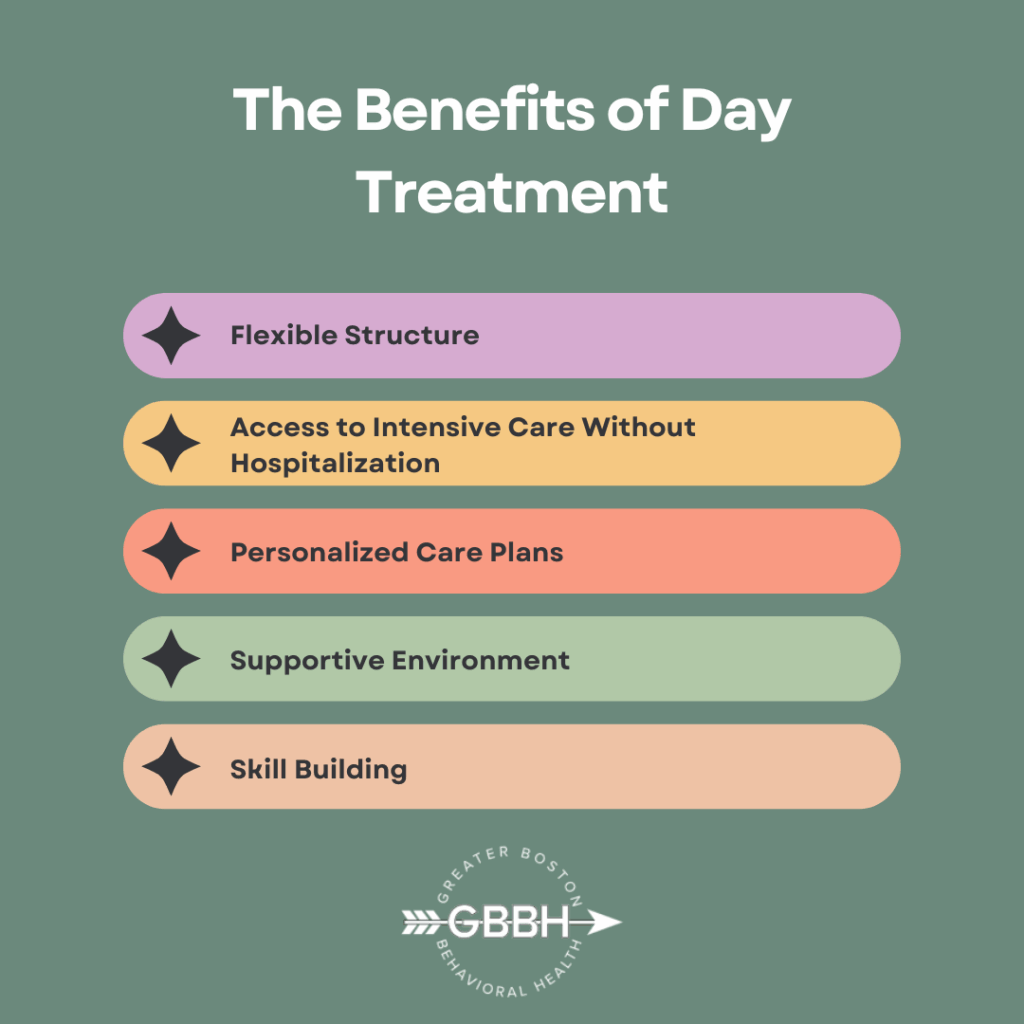Navigating the path to mental wellness can be challenging, especially when deciding on the best treatment options. Day treatment programs, also known as partial hospitalization programs (PHPs) or intensive outpatient programs (IOPs), offer a balanced approach to mental health care that blends the intensity of inpatient care with the flexibility of outpatient services. This guide will help you understand if day treatment is the right choice for you or your loved one.
What is Day Treatment?
Day treatment is a structured, therapeutic program that provides comprehensive mental health care without requiring an overnight stay. These programs typically run for several hours a day, multiple days a week, and are designed to provide support, structure, and therapy for individuals dealing with various mental health challenges. Day treatment bridges the gap between inpatient hospitalization and traditional outpatient care, offering a more hands-on approach to recovery while allowing individuals to maintain their daily routines.
Who Can Benefit from Day Treatment?
Day treatment programs can be beneficial for individuals facing a range of mental health conditions, including depression, anxiety, bipolar disorder, personality disorders, and other emotional or behavioral issues. It’s particularly suitable for those who:
- Need More Support Than Traditional Outpatient Therapy: Day treatment provides a higher level of care than weekly therapy sessions, making it ideal for those who need intensive support but do not require full hospitalization.
- Are Transitioning from Inpatient Care: For individuals coming out of a hospital stay, day treatment offers a structured environment that helps ease the transition back to everyday life.
- Require a Structured Environment: The structured setting of day treatment helps those who need consistent, daily guidance to manage their symptoms, improve coping skills, and develop healthier habits.
- Want to Avoid Hospitalization: For individuals seeking significant support without the confinement of inpatient care, day treatment offers a flexible alternative.
Therapy Options
Day treatment programs are multifaceted, offering various therapeutic modalities tailored to individual needs.
Dialectical Behavior Therapy (DBT)
Originally developed for individuals with borderline personality disorder, Dialectical Behavior Therapy is now widely used in day treatment settings to help those struggling with emotional dysregulation, self-harm, and suicidal ideation. DBT teaches skills in mindfulness, distress tolerance, emotional regulation, and interpersonal effectiveness, empowering individuals to navigate their emotions and relationships more effectively.
Group Therapy
This communal approach fosters a sense of connection and reduces feelings of isolation, which can be critical for recovery.
Individual Therapy
One-on-one sessions with a licensed therapist allow for personalized treatment, addressing specific issues that may not be fully explored in group settings. These sessions provide a safe space to delve into personal challenges, set goals, and monitor progress.
Family Therapy
Involving family members in treatment can be crucial for long-term success, as it helps improve communication, resolve conflicts, and educate loved ones about the individual’s condition. Family therapy sessions aim to create a supportive home environment that reinforces recovery efforts.
The Benefits of Day Treatment
Day treatment offers numerous advantages that make it a compelling choice for many individuals:
- Flexible Structure: Unlike inpatient programs, day treatment allows participants to return home each evening, maintaining some level of normalcy and connection to their daily lives.
- Access to Intensive Care Without Hospitalization: Participants receive a high level of care, including therapy, medication management, and monitoring, without the need for overnight stays.
- Personalized Care Plans: Programs are tailored to meet individual needs, ensuring that each participant receives the most appropriate treatment for their specific condition.
- Supportive Environment: The group setting fosters a sense of community, providing encouragement and understanding from peers who share similar struggles.
- Skill Building: Day treatment programs emphasize skill development, equipping participants with practical tools to manage their symptoms, reduce stress, and improve overall functioning.
Is Day Treatment Right for You?
Determining if day treatment is the best fit for your recovery involves evaluating several factors:
- Severity of Your Condition: Day treatment is ideal for individuals who need intensive support but are not in crisis or requiring 24-hour care. If your condition is severe or requires constant monitoring, a residential program might be more appropriate.
- Daily Responsibilities: Consider whether you can manage your daily responsibilities while attending a day treatment program. If you have work, family, or other obligations that make it challenging to commit to a full-time residential program, day treatment offers a viable alternative.
- Support System: Assess the strength of your support system at home. Day treatment programs work best when you have a stable, supportive environment to return to each evening.
- Treatment Goals: Reflect on your recovery goals and whether day treatment aligns with them. If you seek intensive therapy with the flexibility to integrate into daily life, day treatment may be a suitable option.
- Personal Preferences: Think about your preferences for treatment. If you value the ability to stay at home while receiving structured support, day treatment can offer a balanced approach to recovery.
How to Determine if Day Treatment is Right for You
Deciding if day treatment is the right fit involves evaluating your specific needs, current level of functioning, and the severity of your symptoms. Here are some questions to consider:
- Have you recently completed inpatient treatment and need ongoing support?
- Are you seeking a structured environment that offers intensive care without the need for hospitalization?
- Do you want to engage in daily therapeutic activities while still maintaining some level of independence?
Speak with a mental health professional to assess your situation and explore the available programs that could best support your recovery journey.
Finding the Right Day Treatment Program
Choosing the right day treatment program is crucial. Look for a reputable mental health treatment center in Massachusetts or your local area that offers a variety of therapies tailored to individual needs. Ensure that the center provides evidence-based treatments like CBT, DBT, and other supportive therapies to maximize your chances of a successful recovery.
Final Thoughts
Day treatment offers a unique opportunity to receive intensive, structured care while maintaining your independence. If you’re feeling overwhelmed by your symptoms or need more support than outpatient therapy can provide, day treatment could be the bridge to recovery that you need. Reach out to GBBH mental health professional to discuss your options and take the next step toward a healthier, more balanced life. Call us today at (888)278-0716 to begin healing today.
FAQ About Is Day Treatment Right for You?
How does day treatment differ from residential treatment?
Day treatment differs from residential treatment in that participants return home each evening rather than staying in a treatment facility 24/7. Residential treatment offers more intensive support and supervision, making it suitable for individuals requiring constant monitoring.
Is day treatment suitable for everyone?
Day treatment is generally suitable for individuals who need intensive support but are not in immediate crisis or require 24-hour care. It is ideal for those who can manage daily responsibilities while attending therapy sessions and have a supportive home environment.
How do I know if day treatment is right for me?
To determine if day treatment is right for you, consider the severity of your condition, your ability to manage daily responsibilities, the strength of your support system, your recovery goals, and personal preferences. Consulting with a healthcare professional can help you assess whether day treatment aligns with your needs.
Can I work or attend school while in a day treatment program?
Yes, one of the advantages of day treatment is its flexibility. Participants can often continue working or attending school while participating in the program. The structured schedule is designed to accommodate these responsibilities.
How long does a day treatment program last?
The duration of day treatment programs varies depending on individual needs and the specific program. Programs typically range from a few weeks to several months. Your treatment team will help determine the appropriate length of time based on your progress and goals.


